Respond purposefully to the unique needs of your Long Term English Learners
An ELD curriculum intentionally designed for LTEL's Success
Long-Term English Learners (LTELs) face unique challenges that extend beyond basic language acquisition. Many have spent years in English Learner programs without reaching full proficiency, often due to gaps in academic vocabulary, literacy skills, and access to rigorous instruction. These gaps can widen over time, affecting their performance in core subjects. National data shows that LTELs significantly underperform in comparison to their English speaking peers on state English Language Arts (ELA) exams, and LTELs show little growth from one year to the next. Addressing these challenges requires more than standard support—it demands targeted, data-driven strategies that ensure LTELs engage in rigorous academic work. By focusing on LTELs, schools can bridge these gaps, setting students on a path to long-term success.
Tier I and Tier II Reading Support
Long-Term English Learners need more purposeful, guided reading practice. Their reading scores are significantly below the national average, highlighting a critical need for targeted reading intervention. To address this, we designed a reading curriculum specifically for LTELs that boost academic reading skills and performance on state and local exams. Our LTEL curriculum ensures students read more and receive high-quality, rigorous reading practice and instruction every day, preparing them for college and beyond.
- establish high expectations and provide instant, personalized feedback.
- facilitate multi-modal reading lessons aligned to ELD standards, ensuring 20-60 minutes of designated ELD instruction every day.
- provide up to 60 minutes of online, adaptive reading practice each week to support personalized learning paths.
- automatically grade close reading tasks, allowing more time to focus on individual student progress and targeted interventions.
- build reading fluency and stamina, essential for academic success and confidence.
- deliver lessons with confidence using step-by-step teacher guides and pedagogically sound strategies specifically designed for effective LTEL instruction.
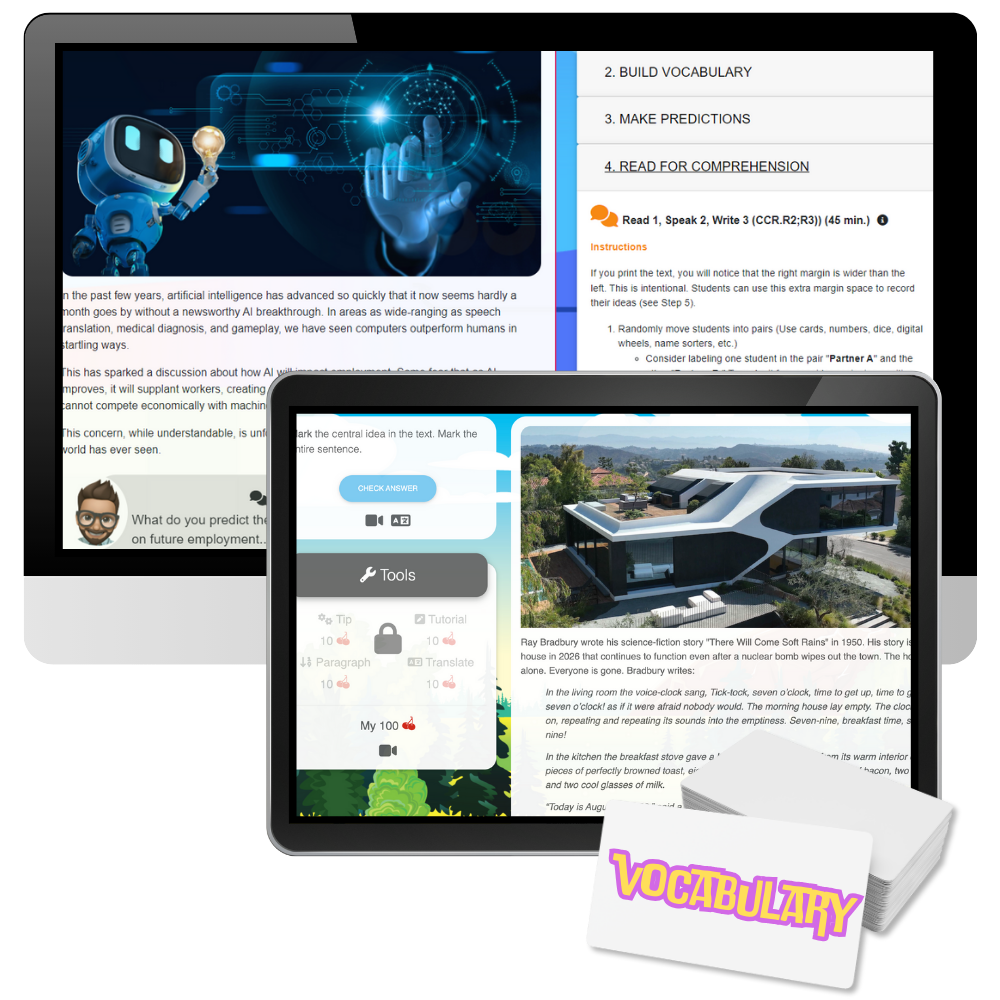
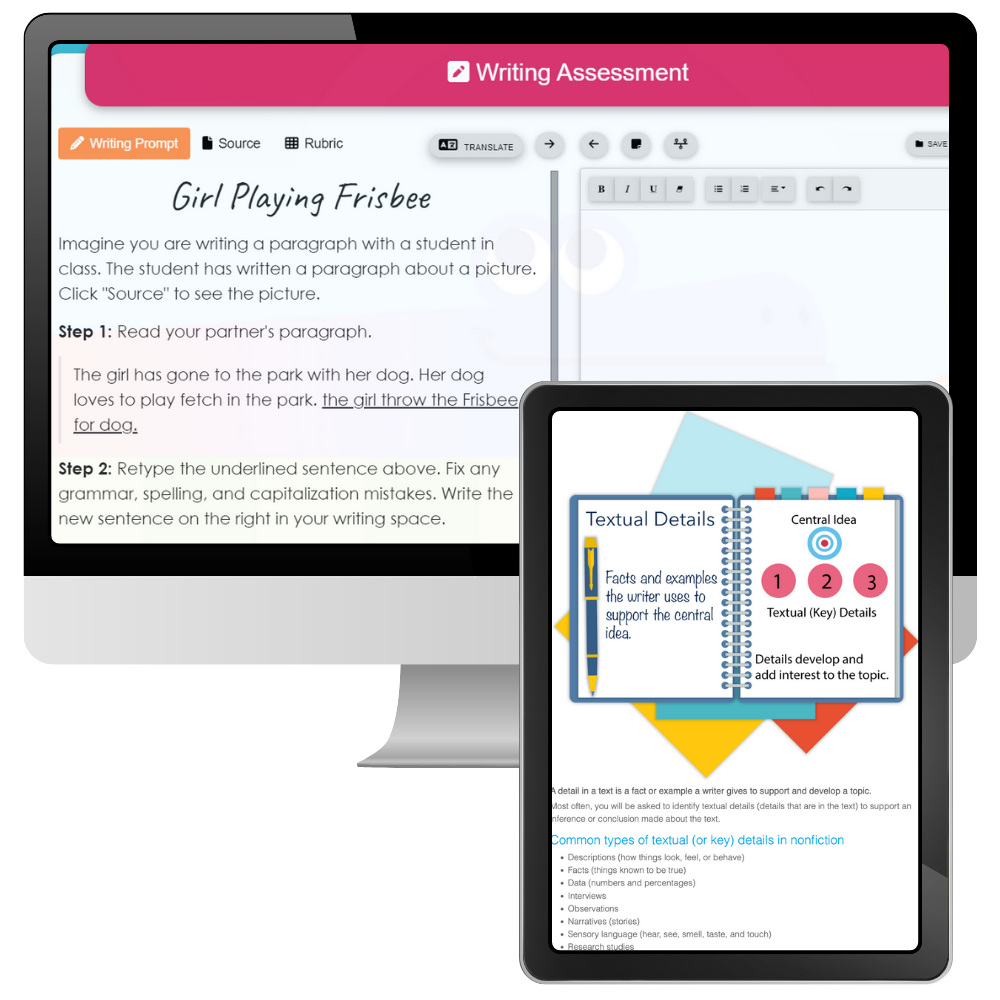
Academic Writing for LTELs
Long-Term English Learners need continuous and targeted academic writing practice and instruction. It's essential to address the opportunity gap that exists for this unique population by explicitly teaching and practicing writing standards every day. By focusing on structured writing exercises with instant, personalized feedback, Long-term English Learners' can develop essential academic writing skills that they need to reclassify, graduate, and be ready for college.
- ensure students receive 20-60 minutes of explicit writing instruction each week that directly aligns to ELD standards.
- practice state writing assessment question types to ensure students reclassify before they graduate high school.
- practice short writing tasks and text-dependent essays that mimic what LTELs are experiencing in their core content classes.
- provide instant, personalized feedback that directly addresses learning targets and goals.
- be data-driven with auto-grading, allowing teachers to focus their energy and time on explicit, skill-based instruction.
Listening Practice & Assessments
Assessing the listening skills of Long-Term English Learners (LTELs) is crucial for their overall language development and academic success. Effective listening comprehension is foundational for understanding classroom instructions, engaging in collaborative activities, and mastering content across subjects. By focusing on listening skills, educators can better support LTELs in building the language proficiency needed to excel academically and communicate confidently.
- explicitly address ELD listening standards.
- identify areas where students struggle with listening, allowing for targeted interventions that enhance their ability to process and retain information
- better support LTELs in building the language proficiency needed to excel academically and communicate confidently
- effortlessly include this language domain in weekly practice, and let us do the heavy lifting of grading listening skills.
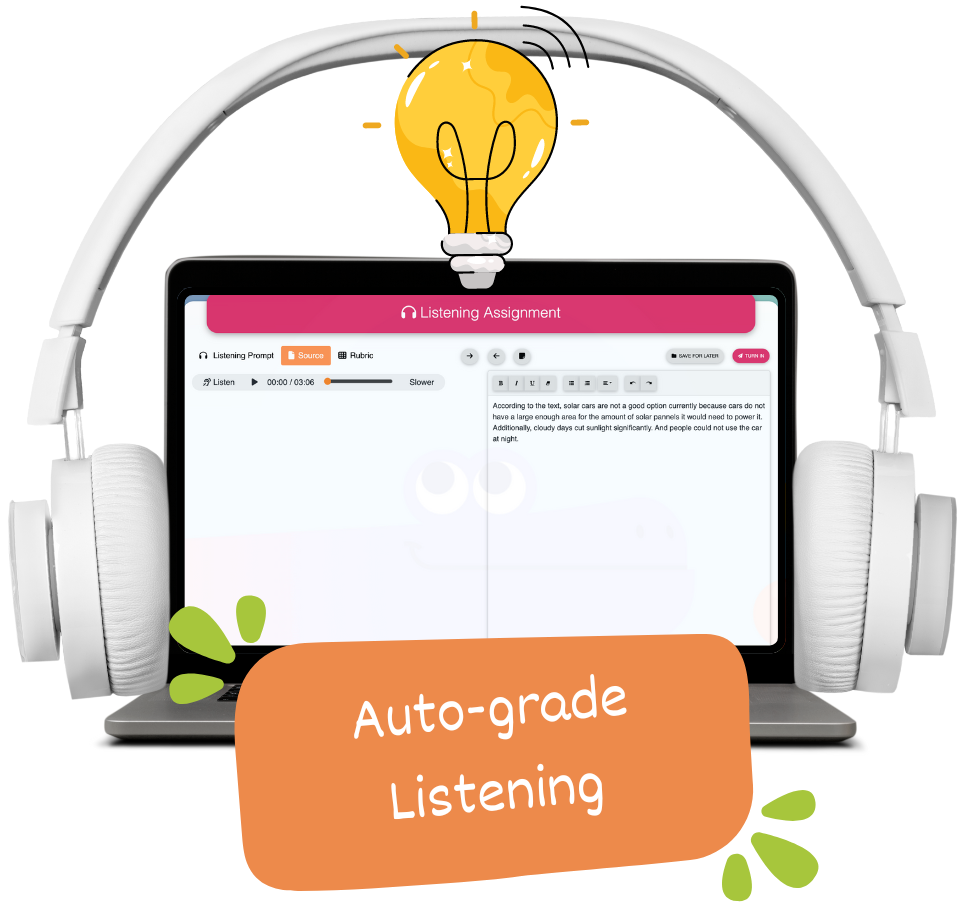
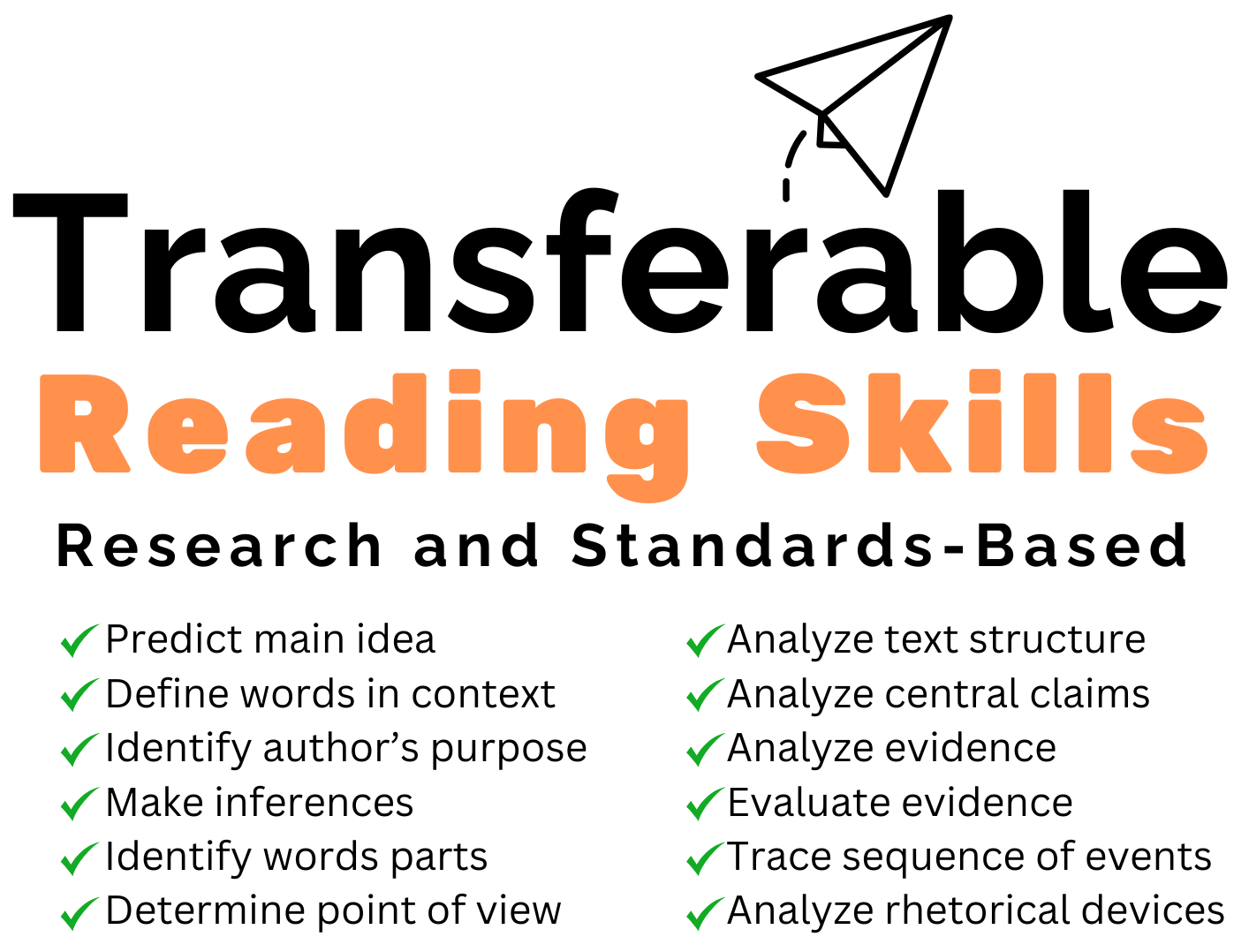
Transferable Skills
Our teacher-driven lessons focus on explicitly teaching essential literacy skills and standards. The grade-level reading, speaking, writing, and collaborative skills taught in our lessons can transfer to other classes and lead to future academic success.
- vertically align reading, speaking, and writing standardsto ensure students are building critical skills at each grade level.
- strengthen students' ability to breakdown complex texts and write about them in sophisticated ways.
- develop analytical and critical thinking skills essential for text-dependent writing tasks.
- rehearse and master a research-based reading and writing process that can be used for various academic tasks.
Structured--Not Formulaic
Recursive literacy routines provide a structured framework for continuous skill development, enabling students to revisit essential literacy skills and strategies regularly. Learning is guided but authentic, so students engage in critical thinking and use language to explore ideas. Through structured exercises and collaborative discussions, LTELs can strengthen their academic reading and writing skills, equipping them with the tools they need to succeed academically.
- keep all minds on with academic conversations.
- build confidence in students as they rehearse predictable routines that help them develop new knowledge.
- develop metacognitive awareness, enabling students to reflect on their learning process and progress.
- leverage the multiple intelligences in the classroom (visual, auditory, kinesthetic, interpersonal, and linguistic-verbal).
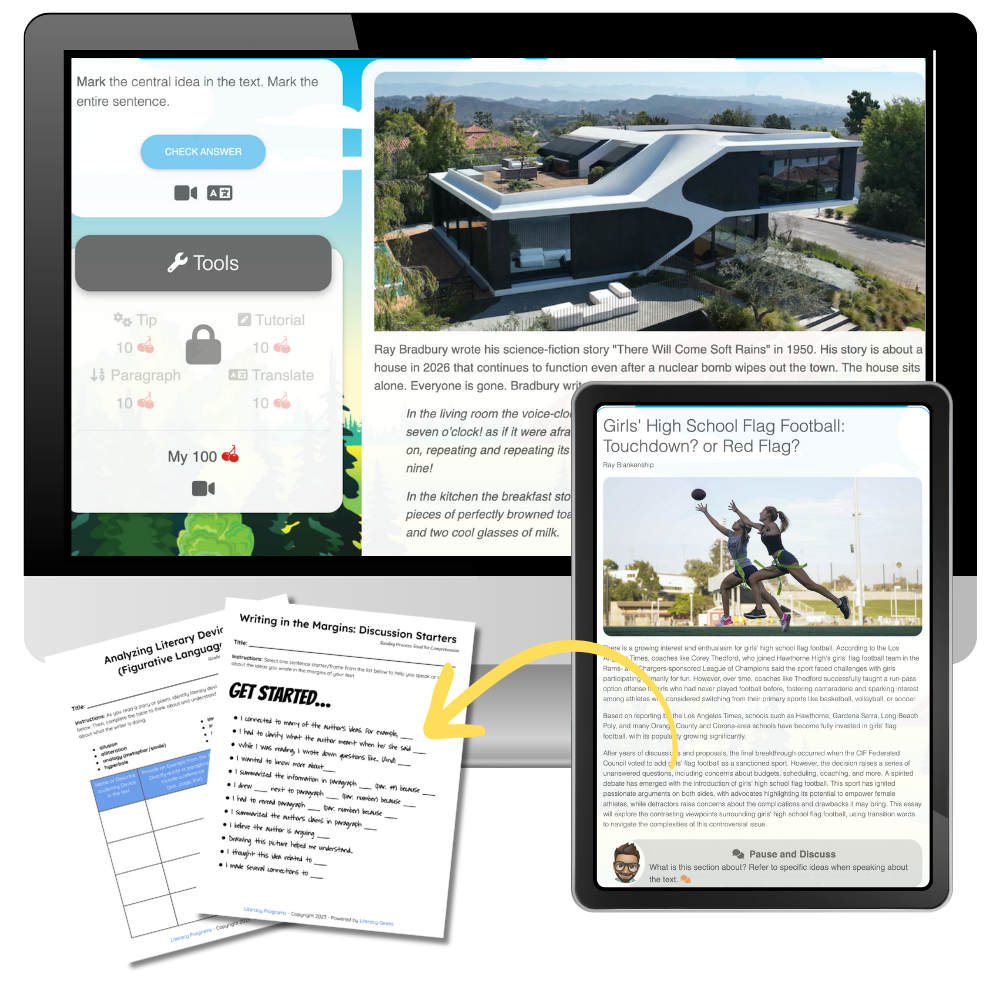
LTEL Instructional Practices: The Difference Is in the Pedagogy
High Expectations
Setting high expectations with the appropriate support is critical for engagement, growth, and confidence.
Cognitive Learning
Students can use a strategy independently and strategically when they learn how, when, and why to use it.
Spiraled Instruction
Rehearse skills and gradually increase complexity, accelerating learning through repetition and practice.
Step-by-Step Teacher Guides
Each lesson carefully guides the facilitation of active learning routines with step-by-step instructions, so teachers feel confident as they deliver powerful literacy lessons. Teacher moves are explicitly stated and strategies for increasing engagement and access for all students are embedded throughout the lesson.
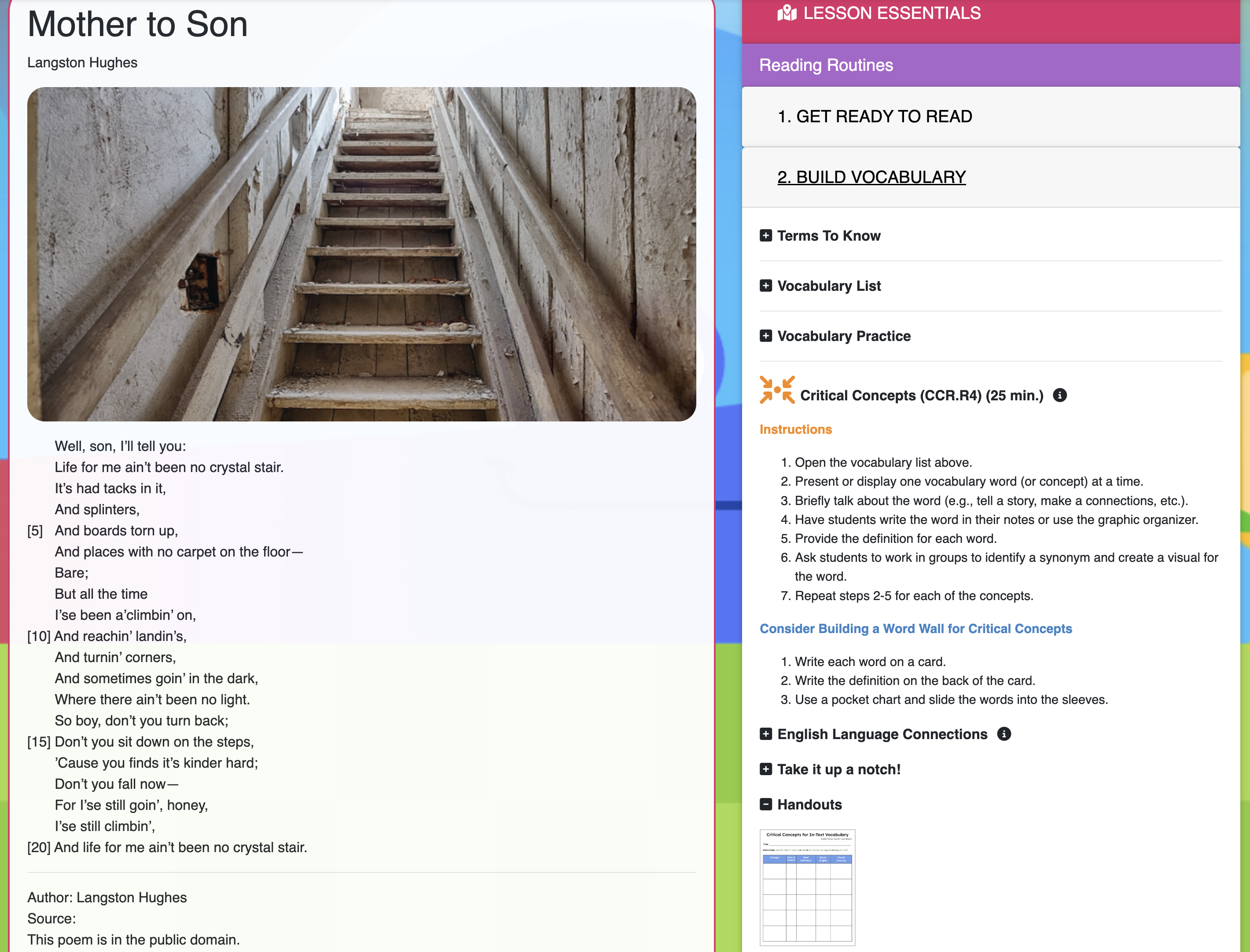

Routine-based Learning
Our learning routines are designed to support long-term English learners by building a strong sense of community and providing a consistent structure. This predictability helps reduce anxiety and increase focus, making the learning process smoother.
Each routine includes clear, step-by-step instructions, which helps students feel confident and secure. By promoting independence and responsibility, these routines empower students to take control of their own learning. Additionally, our methods cater to different learning styles—visual, auditory, and kinesthetic—ensuring that all students, regardless of their individual needs and abilities, are engaged and supported. This approach aligns with Universal Design for Learning (UDL) principles, making education accessible and effective for everyone.
Intentional Vocabulary Instruction
Each lesson offers a vocabulary-rich experience designed to teach essential, grade-level words in context.
At the start of each lesson, students learn key concepts that are crucial to understanding the text. Through engaging vocabulary activities like visual aids, skits, and word games, students explore and absorb new words. They also have the chance to enhance their own learning by identifying unfamiliar words in their reading materials.
Our Pinpoint Language Tool provides definitions and additional context and examples of in-text vocabulary, helping students understand both the meaning and usage of new words.
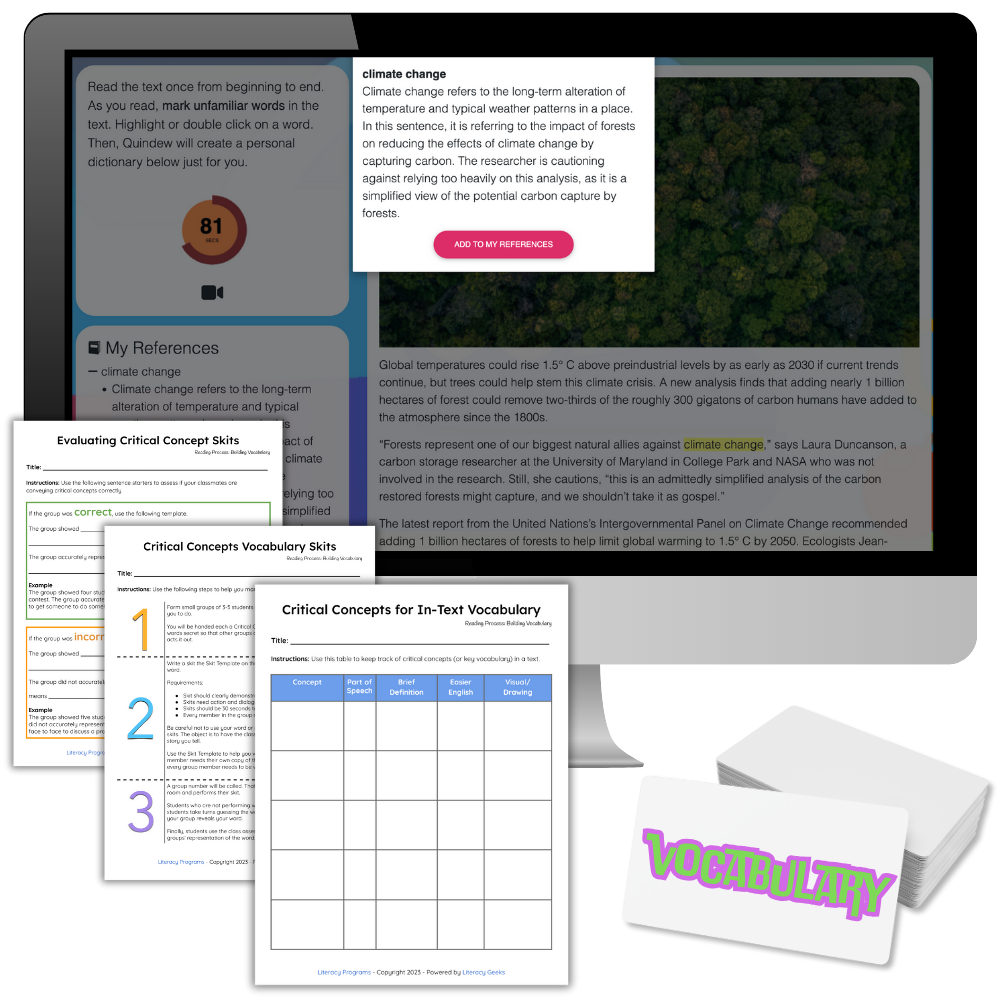
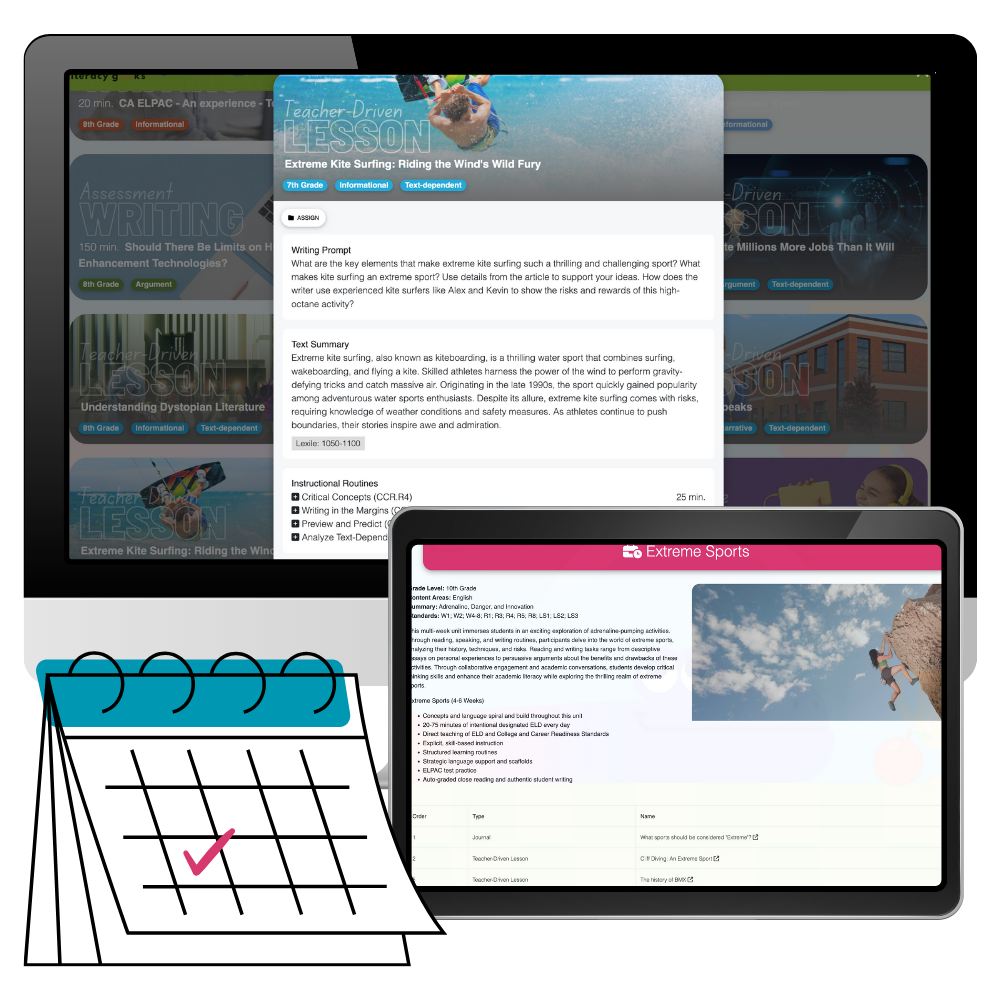
Assign Single Lessons or Units
Teachers have the flexibility to assign single lessons or themed units from the our Multiverse--reading, writing, and listening activities and assessments.
Assigning a lesson to a class is a snap! Teachers can preview the standards and outcomes for the lesson, review the skills that will be taught, and go through the pre-reading, during reading, and post reading activities. If a teacher wants to teach the lesson, all they have to do is click "Assign to Class."
Students will see the lesson in their Assignments immediately after it has been assigned.
Our Lessons Have 8 Key Teacher Moves!
Lesson Essentials
Each lesson provides a clear text summary, an essential question (EQ), Lexile reading level, and options for customizing support like turning on embedded discussion questions and text-leveling.
Get Ready to Read
Each lesson begins with a prompt that students analyze. The prompt explains what students should be focused on while reading; and it can be used for text-dependent writing practice and instruction.
Build Vocabulary
There are numerous opportunities to build vocabulary in each lesson. During this step in the process, students study critical concepts and "play" with various grade-level vocabulary words from the text.
Make Predictions
Complete this step before or after our vocabulary activities. Students study the image at the top of the article, read the first and last paragraphs, and make a prediction about the text's topic and structure
Comprehension
Once students mark their prompts, explore vocabulary, and make predictions, they are ready to start a reading comprehsion routine. Our comprehension routines are highly structured and engaging.
Analysis
Most of our lessons have analytical routines called Reading for Deeper Meaning. These routines ask students to go beyond what an author says and look closely at what an author does in a text.
Review
There are opportunities in each lesson to review key components. There are vocabulary review activities, comprehension questions that we recommend doing in groups, and summary activites.
Reading to Write
Each lesson offers post-reading activities that teach specific writing skills like integrating sources and a text-dependent writing assignment that follows a standards-based process...that we grade!
Multilingual Learner Program (MLL)
Newcomer
Curriculum
Empowering newcomers through differentiated, asset-minded curriculum and resources for middle and high school.
ELD
Curriculum
Accelerate English language development for multilingual learners with structured reading, speaking & writing curriculum.
LTEL
Curriculum
Address the unique needs of Long-Term English Learners with rigorous and engaging grade-level reading and writing curriculum.